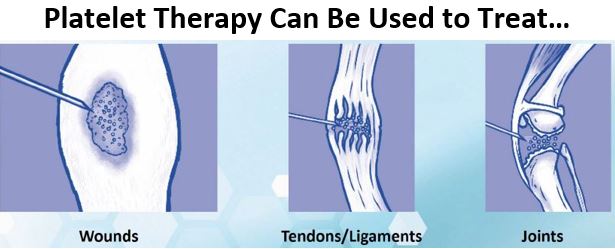In addition to stem cell processing services, VetStem distributes platelet therapy kits to small and large animal veterinarians across the United States and Canada. Platelet therapy is similar to stem cell therapy in that the patient’s own cells are collected, concentrated, and then reinjected into the affected area. Unlike stem cell therapy, platelet therapy requires a blood collection and the process of concentrating the healing cells is performed by your veterinarian in the clinic.
How does platelet therapy work? The scientific answer is that platelets activate by exposure to damaged tissue, releasing their granular contents which include anabolic growth factors. These growth factors help attract progenitor cells to the injury site and play a key role in stimulating tissue repair through fibroblast expansion and cellular matrix production. In other, less technical terms, when the concentrated platelets are injected into the site of damaged tissue, the platelets signal additional healing cells to migrate to the affected area to begin the process of tissue repair.
The great thing about platelet therapy is it can be performed in conjunction with stem cell therapy to further aid the healing process. In our opinion, stem cell and platelet therapies are very different regenerative medicine solutions that can work synergistically. They each have their place and can benefit patients in different circumstances. We see the combination of adipose stem cell therapy and platelet therapy as the “platinum standard” for regenerative medicine. While the idea of stem cell therapy is to deliver as many regenerative cells to the affected area as possible, by adding platelet therapy on top of it, additional healing cells will migrate to the area to further stimulate local tissue repair processes. And like stem cell therapy, platelet therapy is autologous, meaning the animal is both the donor and the recipient. Thus, there is minimal risk of rejection and reaction when performed under sterile conditions.
Our primary platelet therapy product for small animals is Pall Veterinary Platelet Enhancement Therapy or V-PET™. We’ve seen much success with V-PET™ such as in Pippa Rose’s case and Pearl’s case. But, similar to stem cell therapy, every patient’s response will vary. Your veterinarian can best determine if your dog may benefit from platelet therapy.
If you have questions or would like VetStem to help you locate a platelet therapy provider near you, please contact us. To read more about platelet therapy and success stories, click here and here.





